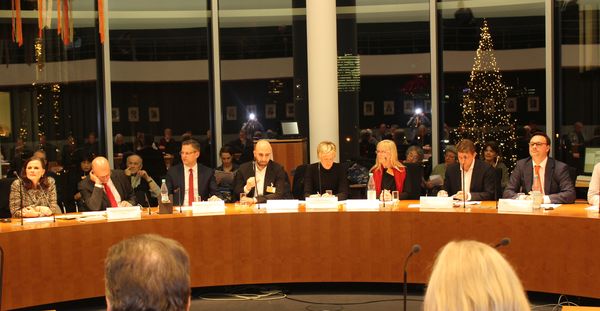Radical Partners - Cooperation with Islamic Associations criticized at debate in the Bundestag
Berlin, 17 December 2018
At Wednesday, 12th December 2018, Gitta Connemann, the CDU / CSU deputy chairperson, invited to a debate in the German Bundestag with the title "Radical Partners? Conservative Islamic associations and influence from abroad". The event took place in cooperation with the Mideast Freedom Forum Berlin.

- Gitta Connemann, Fritz Felgentreu, Christoph de Vries, Ahmad Mansour, Ulrike Becker, Susanne Schröter, Michael Leutert, Oliver Luksic
In front of a hundred guests from politics and civil society, two renowned experts, the psychologist and author Ahmad Mansour and the ethnologist Prof. Dr. Susanne Schröter discussed the cooperation of the state with the major Islamic associations in Germany with politicians from the German Bundestag Christoph de Vries (CDU), Fritz Felgentreu (SPD), Michael Leutert (DIE LINKE) and Oliver Luksic (FDP).
While many stress that there is no alternative than cooperation with the large Islamic associations in order to integrate Muslim immigrants into the German society, this debate focused on the problematic aspects of the Islamic associations, in particular on their links to extremist ideologies and groups.
The debate focused on the association DITIB which is under the oversight of “Diyanet”, an official institution of the Turkish State; on the “Central Council of Muslims” and on the “Islamic Community of the Shiite Communities of Germany” (IGS). The latter receives public funding from the German government and the European Union for countering Islamist radicalization, despite its links to the antisemitic regime in Iran.
The experts criticized the large Islamic associations in general as well as some of their subgroups.
Ahmad Mansour said: "The understanding of Islam of the conservative associations in Germany promotes literalism, gender segregation, extreme friend-foe thinking and an education based on fear. These associations are a part of the problem and cannot be partners. Unfortunately, they get significant government funding. Our problem here in Germany is that we have no strategy on how to answer the question: what helps against Islamist radicalization? We need schools that are able to convey values, responsibility and autonomy. "
Prof. Dr. Susanne Schröter pointed out that many Muslim associations are dependent on totalitarian regimes abroad. She urgently recommended to take measures against the influence of totalitarian regimes on Islamic communities in Germany. One example is the “Islamic Center Hamburg” (IZH), which is an institution of the religious Islamist leadership in Iran. Schröter said: "We need political efforts to develop a German Islam. Islam can settle here, but it's a long process. The Islamic associations, which represent only 20% of Muslims in Germany, are trying to prevent this. They are therefore part of the problem and not part of a solution."
The parliamentarians intensely engaged in the debate.
Christoph de Vries (CDU) said: "You cannot fight Salafists with Islamists. Anyone who has this world view cannot be a partner in the fight against radicalization. From our point of view, no representative of the IZH must have a leading position in the Shura – the council of the Islamic communities in Hamburg. I believe neither IGS nor DITIB should get public funding. To this end I have had conversation with my fellow parliamentary colleagues."
Fritz Felgentreu (SPD): "The Central Council of Muslims owes its influence to the good public relations work of Aiman Mazyek. The Central Council of Muslims is actually a very problematic partner. It organizes only a few number of associations, among them the Muslim Brothers and Gray Wolves, i.e. Turkish right-wing extremists. The state cannot cooperate with opponents of the free democratic basic order."
Michael Leutert (Left Party - Die Linke): "The values that we represent are not represented by these associations. We can talk to everyone, but we must not finance these associations. 700,000 Euros for DITIB are a bad investment. On a different level, European grants to the Palestinian Authority enable the funding of what is known as pensions for terrorists. Such aid will do the opposite of the intended deradicalization."
Oliver Luksic (FDP) concluded: "I think it is a scandal that President Frank Walter Steinmeier meets with representatives of the IGS. I support the three claims of the MFFB. Firstly, the IGS cannot be a partner of the Federal Government. Secondly, associations that spread antisemitism must not be supported. Thirdly, the extremist ideology of these associations should not be downplayed. "
The Mideast Freedom Forum Berlin announced in the Bundestag the publication of a policy paper on the IGS.
UPDATE (March 2019): The announced Policy Paper kann be read here (in German).

 English
English